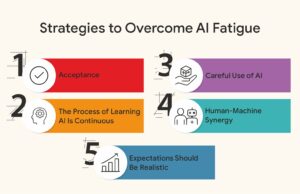The rush of incorporating AI into every aspect of life is massive now. Everything looks to be “AI-powered”. Whether it is an online or offline world, AI is around us and only here to stay and grow. Assistants like Alexa and Siri, gadgets like Robotic AI vacuum cleaners or smart speakers are around us and are now a part of us.
There comes a point when something which is brilliant yet starts to become overwhelming when overused. This sense of exhaustion, which keeps growing is known as AI fatigue. This doesn’t mean it’s not useful or interesting anymore, but overuse tends to exhaust things, however good it is.
But why is AI fatigue happening? How can you overcome it? Let’s take a closer look. Shall we?
What Does AI Fatigue Mean?
AI fatigue occurs when a never-ending bombardment of news, information, conversations, or developments in AI leads to burnouts, deflation, and a feeling of exhaustion. This event results from the market being overrun with AI tools and news, which makes people feel overwhelmed and overloaded. For instance, how long does it take you to decide what to watch on any streaming platform?
Making a choice would be much simpler and faster if you had fewer options. Reluctance to use AI technologies, a lack of excitement for investigating novel AI solutions, and skepticism about the revolutionary potential of AI are common signs of AI fatigue for both individuals and organizations. The idea that AI is being promoted as a universally applicable solution to all issues, ignoring the subtleties and complexity of the real world, is the cause of this decline in adoption.
Causes of AI Fatigue
Intensity of Information on AI
There are updates about AI innovations and marketing campaigns everywhere in the digital world. Sorting through all of this noise can be very taxing for those who are trying to keep up. Exuberance subsides, and exhaustion sets in as the distinction between genuinely revolutionary advancements and passing trends becomes hazy. For instance, in a sea of technological advancements, it's difficult to predict whether the most recent AI model that makes headlines will be a game-changer or merely another passing fad.
Hey AI, Solve Everything for Me!
AI is frequently promoted as an antidote that can resolve anything from small annoyances to significant operational difficulties. But this excitement, which is supported by how it is portrayed in the media and widespread misunderstandings about its potential, raises expectations too high.
Additionally, a lot of users are under pressure to embrace AI without fully being aware of its complexities, which leaves them disappointed when it falls short of their expectations. A common situation would be a company using AI to handle customer support only to find that the system has trouble answering intricate questions that call for human expertise.
Change Is Sometimes Too Much to Handle!
Rapid digital transformations are taking place in organizations, and employees are frequently pressured to adjust to these changes more quickly than they are comfortable with. Staff morale may suffer because of this hectic pace, and they may become disinterested in yet another piece of software or tool.
What Can We Do to Overcome AI Fatigue?
Increased annoyance with AI tools and a reluctance to interact with them can result from AI fatigue. Constantly interacting with AI outputs that don't grasp context, or particularities can wear people out. Furthermore, if people rely too much on AI, it can impair their ability to think critically and make decisions, making them feel like inert parts of the technology they use.
Let’s start the strategies with the last step of “5 stages of grief” –
Acceptance
Recognize that artificial intelligence is going to be here. It has a lot of potential and is a strong tool. You can approach AI solutions with an open mind and concentrate on how they can help you if you accept this reality.
The Process of Learning AI Is Continuous
Keep in mind that it takes time and training to understand complicated subjects like AI. Allow yourself time to take in new information without jumping to conclusions or applying it right away.
Understanding AI tools' potential as well as their limitations is essential. To progressively increase your understanding of AI, think about signing up for workshops or online courses. Furthermore, practical AI experience can enhance your skill set and clarify its features.
Careful Use of AI
Effective use of AI can be determined by having a thorough awareness of the advantages and disadvantages of AI tools as well as a clear understanding of your needs. It's crucial to fight the urge to use AI just to keep up with the latest trends. Furthermore, there is no one-size-fits-all solution. It might be possible to complete some tasks more effectively without heavily depending on AI. In the end, technology should make your job easier rather than more difficult.
Human-Machine Synergy
Not to be overlooked is the human component. AI can't replace human creativity, empathy, and critical thinking, but it does thrive on data. Using AI's accuracy and efficiency in conjunction with human knowledge is the way of the future. A more successful approach to problem-solving is fostered by this synergy.
Expectations Should Be Realistic
When it comes to implementing new AI tools, company executives shouldn't overpromise. Clear and attainable expectations are essential, and care must be taken when selecting new AI models and tools.
Final Thoughts
Any innovation, especially those that hold the potential to be transformative, can experience fatigue; it is not just a problem with AI. AI Fatigue can have a major impact on productivity, so it's critical to identify and address it in the workplace. Businesses should consider whether integrating new technologies, such as artificial intelligence (AI), actually solves problems or, ironically, creates new ones.
A future in which technology enhances rather than takes over our lives will be shaped by our careful handling and application of these tools as we continue to develop alongside AI.
Visit secureitworld to learn more!
Recommended For You:
RAG vs Agentic RAG: The Evolution of Smarter, More Dynamic AI Systems






